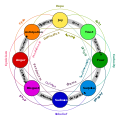Kindness

| Part of a series on |
| Emotions |
|---|
  |
Kindness is a type of behavior marked by acts of generosity, consideration, or concern for others, without expecting praise or reward in return. It is a subject of interest in philosophy, religion, and psychology.
It can be directed towards one's self or other people, and is present across multiple different species and cultures.
History
In English, the word kindness dates from approximately 1300, though the word's sense evolved to its current meanings in the late 1300s.[1]
In society
Human
In psychology
Studies at Yale University used games with babies to conclude that kindness is inherent to human beings.
Barbara Taylor and Adam Phillips stressed the element of necessary realism[jargon] in adult kindness, as well as the way "real kindness changes people in the doing of it, often in unpredictable ways".[6]: 96 & 12

Behaving kindly may improve a person's measurable well-being. Many studies have tried to test the hypothesis that doing something kind makes a person better off. A meta-analysis of 27 such studies found that the interventions studied (usually measuring short-term effects after brief acts of kindness, in WEIRD research subjects) supported the hypothesis that acting more kindly improves your well-being.[7]
Teaching kindness
Kindness is most often taught from parents to children and is learned through observation and some direct teaching. Studies have shown that through programs and interventions kindness can be taught and encouraged during the first 20 years of life.[8] Further studies show that kindness interventions can help improve well-being with comparable results as teaching gratitude.[9] Similar findings have shown that organizational level teaching of kindness can improve the well-being of adults in college.[10]
See also
- Altruism – Concern for the well-being of others
- Compassion – Movement or motivation to help others
- Empathy – Capacity to understand or feel what another person is experiencing
- Generosity – Liberal in giving
- Good – Concept in religion, ethics, and philosophy
- Good faith – Intention to be fair, open, and honest
- Kindness Day UK
- Moral character – Steady moral qualities in people
- Moral emotions – Variety of social emotions
- Reciprocity – Repayment in kind
- Pay it forward – Expression for describing the beneficiary of a good deed repaying the kindness to others
- Random act of kindness – Nonpremeditated act to cheer up another
- Random Acts of Kindness Day – A day to celebrate kindlness
- r/K selection theory – Ecological theory concerning the selection of life history traits
- The Kindness Offensive – North London group known for random acts of kindness
- World Kindness Day – International observance on 13 November
- Greatness – Concept of superiority
References
- ^ "kindness". Online Etymology Dictionary.
- ISBN 9780393932508.
{{cite book}}: CS1 maint: location missing publisher (link)
Further reading
- Brownlie, Julie (2024). "How kindness took a hold: A sociology of emotions, attachment and everyday enchantment". The British Journal of Sociology.
- Keltner, Dacher; DiSalvo, David (January 2017). "Forget Survival of the Fittest: It Is Kindness That Counts". Scientific American.
A psychologist probes how altruism, Darwinism, and neurobiology mean that we can succeed by not being cutthroat.
External links
 The dictionary definition of kindness at Wiktionary
The dictionary definition of kindness at Wiktionary- A UK independent, not-for-profit organisation
- Random Acts of Kindness Foundation
- Video with quotes about Kindness, from Wikiquote

